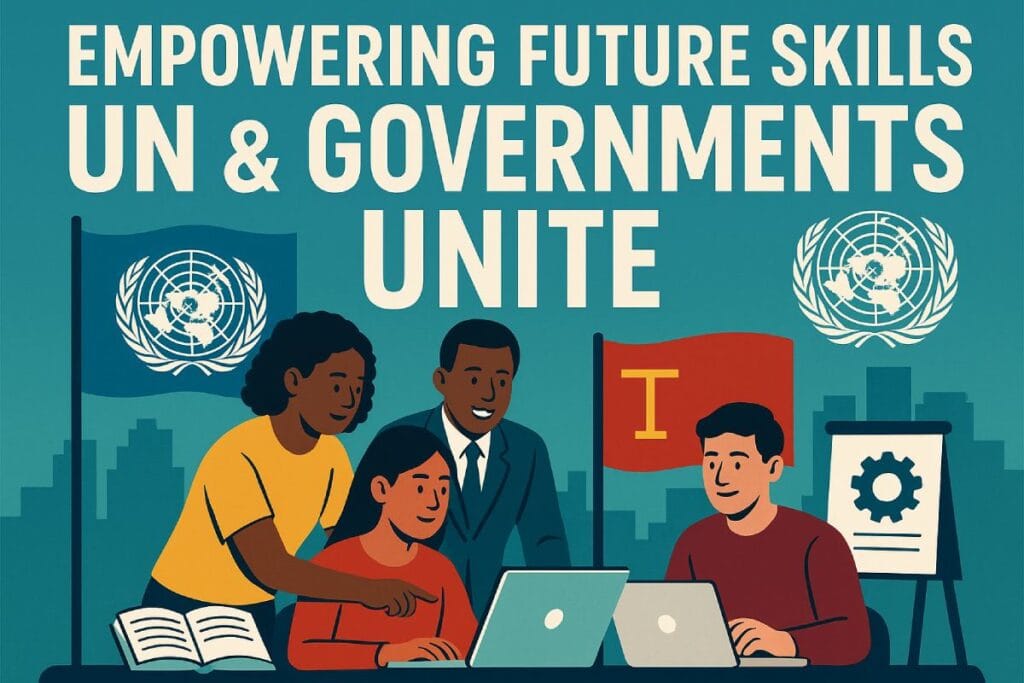Empowering Future Skills: UN & Governments Unite

Introduction
In an increasingly competitive global economy, the development of human capital through skills training and education has become a cornerstone of sustainable growth. Both the United Nations (UN) and national government organizations play pivotal roles in shaping policies, mobilizing resources, and coordinating stakeholders to ensure that individuals acquire the competencies needed to thrive in the 21st century. This article explores how these institutions work—independently and collaboratively—to design frameworks, launch initiatives, and overcome challenges in the quest for inclusive skills development.
UN’s Mandate and Frameworks
The UN’s engagement in skills development is grounded in its broader mandate to promote peace, security, and sustainable development. The 2030 Agenda for Sustainable Development, adopted in 2015, places education and lifelong learning at the heart of several Sustainable Development Goals (SDGs), notably SDG 4 (Quality Education) and SDG 8 (Decent Work and Economic Growth). Through these goals, the UN commits member states to:
- Ensure inclusive and equitable quality education for all.
- Promote lifelong learning opportunities, including vocational training and adult education.
- Facilitate decent work by equipping youth and adults with market-relevant skills.
By embedding skills development within a global framework, the UN provides a shared vision and a set of measurable targets for governments worldwide.
Key UN Initiatives for Skills Development
Several specialized UN agencies spearhead skills-related programmes:
- UNESCO focuses on technical and vocational education and training (TVET), advocating for inclusive curricula and competency-based learning models. Through its Skills and Knowledge programme, UNESCO helps countries reform their TVET systems to align with labour market demands.
- International Labour Organization (ILO) runs the Skills for Employment and Decent Work initiative, emphasizing the creation of skills ecosystems where governments, employers, and training providers collaborate to address skills gaps.
- UN Development Programme (UNDP) integrates skills training into broader poverty reduction and governance projects, ensuring that marginalized communities gain access to livelihood-enhancing competencies.
These initiatives are often supported by global partnerships—such as the Global Partnership for Education—which pool technical expertise and funding to scale programmes in low- and middle-income countries.
Government Organizations at National and Local Levels
While the UN sets the international agenda, national and subnational governments translate commitments into concrete policies and programmes. Ministries of Education, Labour or Skills Development typically:
- Develop National Qualifications Frameworks (NQFs) that standardize skill levels across sectors.
- Accredit and regulate training providers, ensuring quality and relevance.
- Fund public vocational schools and apprenticeship schemes, particularly for youth and disadvantaged groups.
At the local level, provincial or municipal agencies often adapt national programmes to regional labour markets, forging partnerships with local industries and community organizations to deliver tailored training courses.
Public–Private Partnerships and Collaborative Models
Recognizing that governments alone cannot bridge all skills gaps, many countries foster public–private partnerships (PPPs). For example:
- Employer-led training consortia, where industry bodies co-design curricula with technical institutes to ensure graduates meet specific job requirements.
- Work-based learning programmes, including apprenticeships and internships, jointly funded and administered by government agencies and private firms.
- Digital learning platforms, often developed in collaboration with technology companies, which expand access to online courses in both urban and rural areas.
These collaborative models leverage the agility and resources of the private sector while maintaining public accountability and equity objectives.
Challenges and Limitations
Despite progress, several obstacles hinder the effectiveness of UN and government-led skills development:
- Coordination Gaps: Overlapping mandates among agencies can lead to fragmented efforts and duplication of resources.
- Resource Constraints: Many low-income countries struggle to finance large-scale TVET infrastructure or to retain qualified trainers.
- Digital Divide: Inadequate internet connectivity and low digital literacy prevent many learners from accessing online or blended learning programmes.
- Mismatch with Labour Market Needs: Rapid technological change can render curricula obsolete unless continuous feedback loops with industry are established.
These challenges underscore the need for adaptive policies and robust monitoring mechanisms.
Recommendations for Effective Skills Development
To maximize impact, UN and government bodies should consider the following strategies:
- Strengthen Multi-Stakeholder Coordination by creating national skills councils that include representatives from government, industry, academia, and civil society.
- Invest in Trainer Capacity through continuous professional development, incentives for rural postings, and the use of digital teaching tools.
- Promote Lifelong Learning Pathways by recognizing informal and non-formal learning—such as online courses or community workshops—within national qualifications frameworks.
- Leverage Data and Labour Market Analysis to align programmes with emerging sectors and to forecast future skills demands.
- Expand Digital Infrastructure in partnership with private telecoms, ensuring affordable broadband access for remote learners.
By implementing these measures, institutions can build resilient, inclusive systems that adapt to evolving economic landscapes.
Conclusion
The United Nations and government organizations occupy complementary roles in the global endeavour to equip individuals with essential skills. While the UN provides vision, advocacy, and technical guidance at a global level, national and local governments operationalize these goals through policy reforms, quality assurance, and direct programme delivery. Through strategic partnerships, data-driven planning, and a commitment to lifelong learning, these institutions can empower people to participate fully in society and to drive sustainable economic growth.
Source : Medium.com




